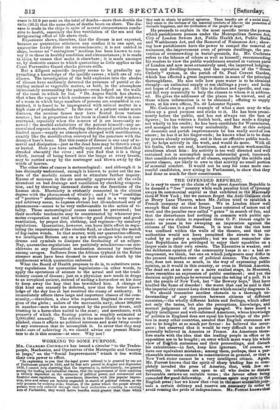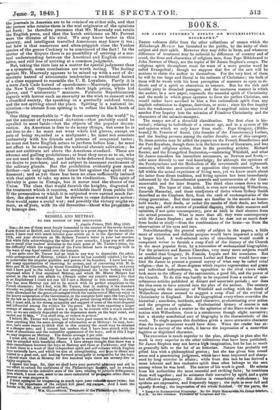THE OFFENDED REPUBLIC.
Ir is east to sneer at the claim of the great American Republic to be deemed a "free " country while such peculiar kind of tyranny swayi its commercial capital as that exhibited in the Macready tiotatif Nett York ; biit we cannot forget the Anti-Gallican riots at Drury Lane -Theatre, when Mr. Jullien tried to eatablish a French company at that house. We in London, kbow well- enough that the rioters at Drury Lane consisted of actors out of work and the peculiar race called " gents " in search of fun, and that the disturbance had nothing in common with public opi- nion: our own claim to repudiate those 0. P. rioters ought to make us pause in too sweeping an imputation against the citizens of the United States. It is true that the riot here was confined within the walls of the theatre, and that our authorities would not have permitted the streets to be in- vaded by so paltry a squabble ; but we must remember also that Republicans are privileged to enjoy their squabbles on a . larger scale in their own streets. The Executive is weaker, and the deliberate opinion of the community keeps it so : a bad ar- rangement, we think, but one on which judgments may differ in the present imperfect state of political science. The riot, there- fore, does not mean so much, in the way of expressing public opinion, as it would in this country, or even in British America. The dead set at an actor on a more exalted stage, in Montreal, more resembles an expression of public sentiment ; and yet the decision might perhaps be reversed upon the taking of a poll. It is not the people of New York, but " the Bowery boys," that have kindled the flame of disorder : the worst that can be said is that the imperial city cannot keep down that which socially disgraces it. We should remember another obstacle to a thorough un- derstanding of any question between citizens of different countries,—the wholly different habits and feelings, which affect not only the tastes, but also the perceptions, knowledge, and mutual judgment of the parties engaged. We have heard a highly intelligent and well-informed American, whose knowledge of politics in England does not equal his knowledge of the poli- tics in many other countries, assured that English statesmen are not to be bought at so much' per favour : he believed the assur- ance; but observed that it would be very difficult to make it generally believed in America or France. An American there- fore starts with the idea that the leading people in office or in opposition are to be bought ; an error which mast warp his whole view of English statesmen and their proceedings, and disturb his calculations—hi fact, keep him ignorant. Of course, We " have our equivalent mistakes; among them, perhaps, that a par- chase.able statesman cannot be conscientious in general, or that a New York rioter cannot be a very intelligent citizen. Again, Mr. Forrest knows that the spirit of sharp tradhig has so cen4- pletely invaded the press of America, that, with few 'ex- ceptions, its columns are open to all who desire to dictate favourable ravievis.on suitable terms ; the rfavour often being concedlicHt*good.:fellowship. A partisan spirit may rule in the English press ;• but Fe know that even in the mast accessible jour- nals a certain delicacy and reserve are necessary in order to avoid rousing the pride of independence. Mr. Forrest knows that the journals in America are to be retained on either side, and that the person who retains them is the real originator of the opinions set forth: he therefore presumes that Mr. Macready can retain the English press, and that the harsh criticisms on Mr. Forrest were the dictates of his rival. We may know better in this country, and intelligent travelled Americans may know it too ; but how is that numerous and ultra-priggish class the Yankee species of the genus Cockney. to be convinced of the fact t In the matter of the dispute there is no possibility of arriving at a mu- tual understanding between the American and English commu- nities, and still less of arriving at a common judgment.
But, taking the riots less as a matter for special judgment than as a symptom, some conclusions are worth noting. The feeling against Mr. thacready appears to be mixed up with a sort of de- mocratic hatred of aristocratic tendencies—a traditional hatred of a class supposed to resemble the U. E. Loyalists. Partly it is a mere Jack Cade hatred of operahouses—Macready appeared at the .New York Operahouse—with their high prices, white kid gloves, and " aristocratic" manners. Patriotic Republicanism regards with horror such an enormity as the wish to consort with a classified society, the speaking in a genteelly subdued voice, and the not spitting about the place. Spitting is a national in- stitution—to abstain from spitting is to refuse the black broth of Sparta.
One thing remarkable in " the freest country in the world" is, not the amount of tyrannical dictation—that probably could be equalled in most lands—but the objects of the popular denun- ciation. An American is free to do many things, but some he is not free.to do : he must not wear white kid gloves, except on pain of being regarded as a malignant ; he must not associate exclusively with his friends and persons of congenial tastes ; he must not have English actors to perform before him; he must not affect to be exempt from the national chronic salivation ; he must not cultivate art above the American standard. These are irksome and galling prohibitions; at least they seem so to us, who are not used to the collar, not liable to be debarred from anything we desire to purchase, and not subject to incessant excitement of the salivary glands. But the prohibition evidently goes much further—not only against the letter but against the spirit of re- finement; and as yet there has been no class sufficiently imbued with that spirit to take up arms in its vindication. The spirit of chivalry is gone in Europe, but it never trod the shores of the Union. The class that would fUrnish the knights, disgusted at the treatment which it receives, withholds itself from public life. If the persecution to which it is aubjected were carried much fur- ther, the class would at last be driven to same defensive action: then would come a social war; and possibly the victory-miglati re- main,' as of yore, with 'its old favourites--7those who propitiate it by homage due.



























 Previous page
Previous page